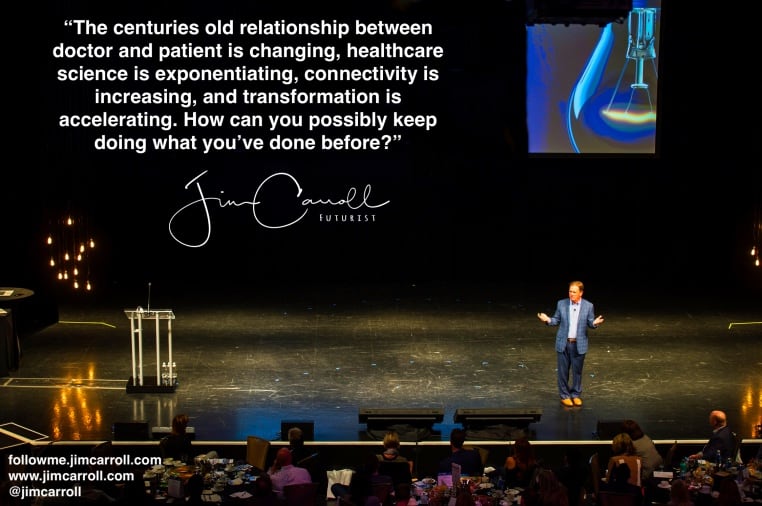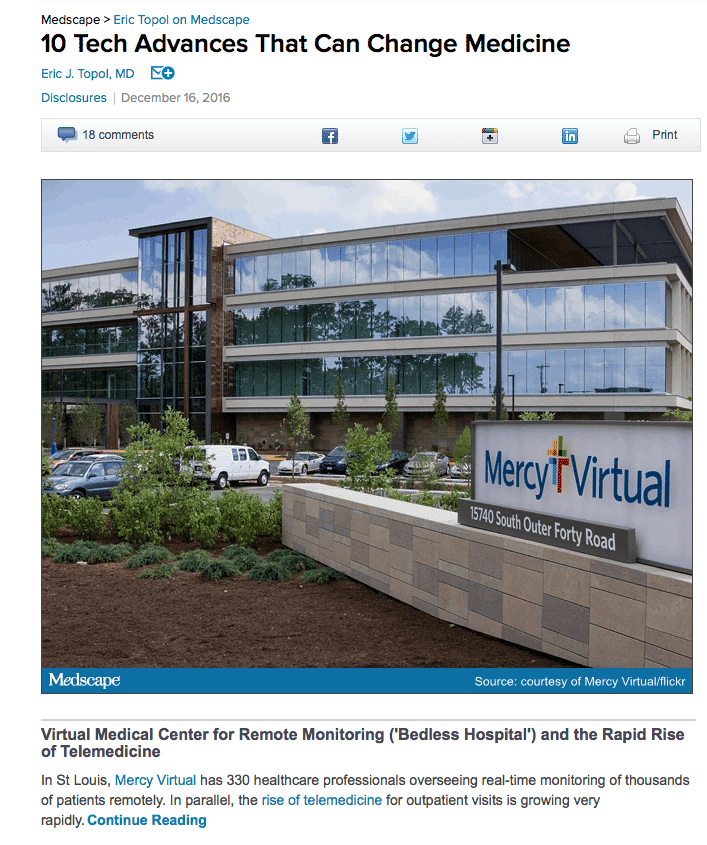Politics dominates the world of healthcare.
When that happens, people tend to lose sight of the remarkable advances, driven by science and innovation that are occurring, that make this one of the most exciting industries out there.

With that in mind, consider the tremendous advances that have occurred with the science and technology of medicine. This is a grab bag of a few of those trends:
- technology is taking over medicine. BIo-connectivity devices such as remote blood pressure monitoring devices allows for the virtualization of many health care services (“bedless hospitals”) at a much lower cost
- Google and other companies are working on a contact lens that will monitor blood sugar/glucose for diabetes patients
- we will soon see ‘smart medical implants’. This will include a contact lens, surgically implanted, that will feature storage, a battery, sensors and other electronics to aid in vision
- we have ingestible pharmaceuticals, such as from Proteus, that report on how well a particular cancer treatment might be working
- global grand challenges and funding are set to solve big diseases, such as a $3 billion fund establish by Facebook founder Mark Zuckerberg and his wife
- we will soon see a computer chip that will diagnose infectious diseases through continue bloodstream monitoring
- 3D printing technologies now allows us to provide customized hip-replacements and other medical implants, or the printing of prosthetics for amputees — including in war ravaged areas such as Sudan and elsewhere
- computational, real time analytical healthcare dashboards will allow us to monitor and track the emerging of infectious diseases and other conditions in real time; Google Flu Trends was a harbinger of what is coming
- smart packaging allows the development of pharmaceutical/drug products that will aid in the use of the product
- digital mobile technologies are allowing many people to ‘get closer’ to their health, by monitoring, gaining a better understanding and actively managing chronic conditions such as blood pressure and diabetes
- wearable sensor technologies (such as the contact lens mentioned above) allows for continuous monitoring of medical conditions
- personalized medicine and pharmacogenetics provides for more targeted drug and medical therapies
- there is continued momentum towards virtualized healthcare concepts that don’t require visits to a doctors office, for common treatable conditions
- patient generated data and shared patent edited medical records are providing for more consultative medical relationships
- ‘frugal innovation’ is leading to such ideas as smartphone-based medical imaging capabilities
- continued rapid advances in the cost collapse of genomic medicine
- AI advances leading to an ongoing decrease in the cost of medical diagnosis, including pathology slides, x-rays, retina scans and more
- continued advances in anti-aging strategies
- inexpensive medical tests, often referred to as a “lab-in-your-pcoket” devices
- the ‘exercise is medicine’ trend which recognizes real methods to reverse the staggering cost of lifestyle disease
- robotic technology advances providing opportunities for those who have lost hands or limbs
But wait, there’s more!
Despite all that, the challenges in healthcare are vast. Aside from the political challenges (which will likely be a gong show), we are faced with a continuing rampup in self-inflicted lifestyle disease (which could cost Western society $150 billion more over 10 years), a shortage of specialized skills, a funding mismatch, expectation gap, anti-science hysteria and more.
But all-in-all, there are a lot of big ideas and bold solutions.
I knew ‘fake news’ was a thing in 2016. Who would expect to see it in the Wall Street Journal?
Does the science of healthcare make a difference? In 2012, I did a keynote for the health care professionals and senior leadership of Mercy Health, and suggested they get aggressively involved in exploring virtual health care ideas. Imagine my surprise when I came access this item today – Mercy Virtual! The initiative was established in 2006, but picked up significant steam from 2013 onwards…. with 300+ patients now being monitored from afar. I sspecifically remember suggesting that as an activity when some questions came up in the Q&A.
It’s nice to know that in my own small way, I am helping to effect big changes in the world of healthcare!





GET IN TOUCH
Jim's Facebook page
You'll find Jim's latest videos on Youtube
Mastodon. What's on Jim's mind? Check his feed!
LinkedIn - reach out to Jim for a professional connection!
Flickr! Get inspired! A massive archive of all of Jim's daily inspirational quotes!
Instagram - the home for Jim's motivational mind!